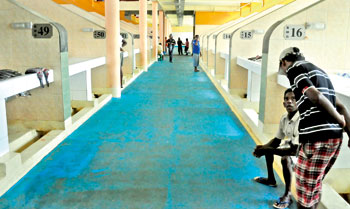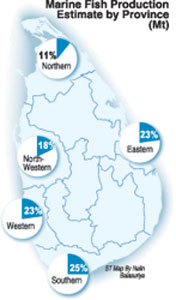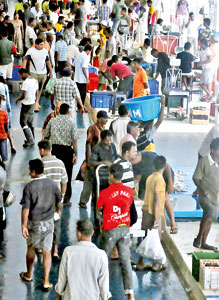Nearly two years after the conflict with expectations running high that more stocks of fish will be available to consumers at low prices, the public continue to pay high prices for fish, a Sunday Times investigation revealed. A range of reasons has been attributed by those in the trade, fisheries officials and the Fisheries and Aquatic Resources Development Minister Rajitha Senaratne.
This week, the Peliyagoda fish market wholesale stalls were selling a kilo of seer at Rs. 1,300, with its retail price ranging from Rs. 1,500 to Rs. 1,600 per kilo. Paraw wholesale was selling at Rs. 480 to Rs. 560 per kilo, while the retail price ranged from Rs. 580 to Rs. 700 a kilo. The wholesale price of a kilo of thalapath was Rs. 500, while the retail prices were above Rs. 600 a kilo.
 |
| The empty retail section at the Peliyagoda fish market . Pix by Mangala Weerasekera |
Though officials claimed that a seasonal drop in catch is affecting prices, official statistics with the Ministry indicate that there was no sharp drop in catch during the season.
Jayasiri Wickremaarachchi of the Peliyagoda Central Traders Association told the Sunday Times that fish from the Northern Province was not coming into the market, and stocks were only coming from the south, as the fish harvest in the north had dropped due to a range of reasons.
“Earlier, fish stocks usually went to Colombo, but now we see that some of these stocks are going to Negombo, while some of the Pettah fish traders have moved out and are doing business on their own,” he explained.
The Sunday Times learns that some of the stall owners have already quit as the wholesale markets were selling small quantities of fish thereby causing losses to them.
Of the 128 retail stalls only 10 are in operation.
An officer of the Ceylon Fisheries Corporation (CFC) Galle, told the Sunday Times that, though usually, large stocks should have been received in the area, this time around the harvest has been less.
“For instance, a kilo of balaya, which is now selling at Rs. 500, should have been around Rs. 300,” he said.
“The catch has reduced drastically, while the number of trawlers going out to sea too has reduced,” he said.
Chilaw CFC Assistant Director Nihal Palitha said there has been a drop in catch during the past two months, mainly because of poaching by Indian fishermen.
 |
 |
| |
The bustling wholesale section at the market |
“This situation could continue in the next months,” he said.
He said that though there is a seasonal drop in the catch, poaching by Indian fishermen has affected the trade.
Matara CFC Assistant Director Sumith Kumara said that they cannot meet the demand because even though boats go out to sea, the harvest has been reduced.
“It will take at least two months to recover from this,” he said.
Dr. Senaratne told the Sunday Times that due to adverse weather conditions, the catch has been reduced, and it would take about one-and-a-half months to get over this situation”.
“In order to get over this situation, we will provide facilities to store fish for long periods and release them when stocks drop,” he said. “Currently, traders are dictating terms, and the CFC will take over control of prices soon,” he said.He also said there were plans to use freezer trucks to get down fish to Colombo from the north-eastern areas.
According to Fisheries Department officials in the north, change of weather patterns and poaching by Indian fishermen have reduced the catch and affected the trade.
He said that the tradition of bottom trawling has already affected the fishing resources in the north, while multi-day fishing crafts have been banned in the north on the grounds that fishing resources will be affected, thereby reducing the supply.
Meanwhile, in Manner, fishing restrictions have been imposed on local fishermen, as they have to obtain passes. Fishing passes are issued only in the morning, making it difficult for them to obtain the passes.
In Mullaitivu too, the fisheries industry is yet to fully recover, as the fishermen have smaller craft “We use only traditional craft, though some of the multi-day trawlers of fishermen from other areas are allowed into the area,” Mullaitivu District Fishermen’s Federation president Arul Jenibert said.
However, Navy spokesman Commander Kosala Warnakulasuriya told the Sunday Times that the rule applies to all fishing areas. |




